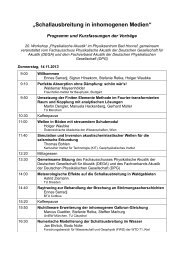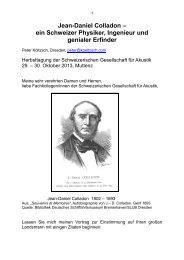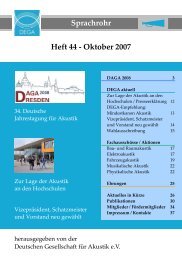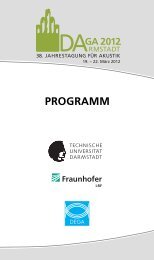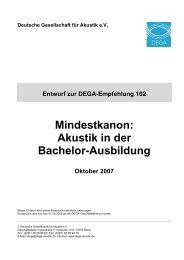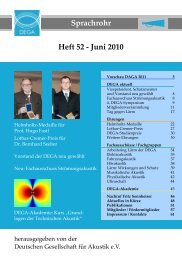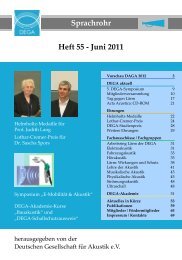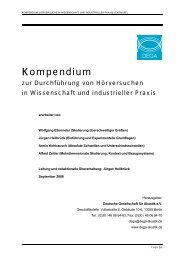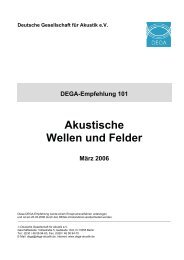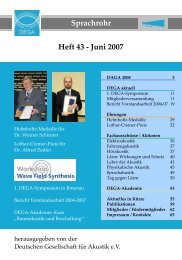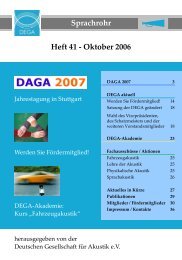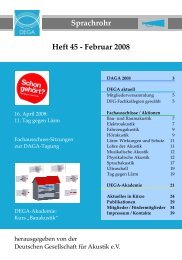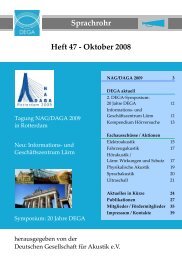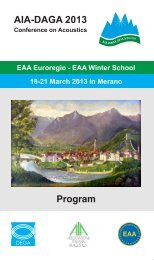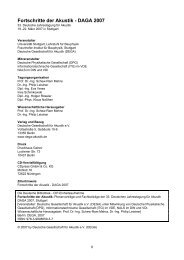- Seite 1 und 2:
DAGA 2010 15.-18. März 2010 in Ber
- Seite 3 und 4:
Programm DAGA 2010 1 Inhaltsverzeic
- Seite 5 und 6:
Programm DAGA 2010 3 Raumakustik .
- Seite 7 und 8:
Programm DAGA 2010 5 Vorkolloquium:
- Seite 9 und 10:
Programm DAGA 2010 7 C 116 C 212 C
- Seite 11 und 12:
Programm DAGA 2010 9 08:30 08:55 09
- Seite 13 und 14:
Programm DAGA 2010 11 15:15 15:40 1
- Seite 15 und 16:
Programm DAGA 2010 13 08:30 08:55 0
- Seite 17 und 18:
Programm DAGA 2010 15 C 116 C 212 C
- Seite 19 und 20:
Programm DAGA 2010 17 Hinweise zur
- Seite 21 und 22:
Programm DAGA 2010 19 Plenarvorträ
- Seite 23 und 24:
Programm DAGA 2010 21 und auf der C
- Seite 25 und 26:
Programm DAGA 2010 23 • Sinus Mes
- Seite 27 und 28:
Programm DAGA 2010 25 • Ulrich Ec
- Seite 29 und 30:
Programm DAGA 2010 27 Anmeldung zur
- Seite 31 und 32:
Programm DAGA 2010 29 • Hierbei e
- Seite 33 und 34:
Programm DAGA 2010 31 dann zum Wohl
- Seite 35 und 36:
Programm DAGA 2010 33 Di. 11:45 Kon
- Seite 37 und 38:
Programm DAGA 2010 35 Im Sinne der
- Seite 39 und 40:
Programm DAGA 2010 37 sein. Anzahl
- Seite 41 und 42:
Programm DAGA 2010 39 Mo. 14:20 Bau
- Seite 43 und 44:
Programm DAGA 2010 41 im Bereich vo
- Seite 45 und 46:
Programm DAGA 2010 43 Mo. 13:50 Gau
- Seite 47 und 48:
Programm DAGA 2010 45 Mo. 15:45 Gau
- Seite 49 und 50:
Programm DAGA 2010 47 experimental
- Seite 51 und 52:
Programm DAGA 2010 49 Mo. 16:10 Gau
- Seite 53 und 54:
Programm DAGA 2010 51 einem aktuell
- Seite 55 und 56:
Programm DAGA 2010 53 Gehörgang un
- Seite 57 und 58:
Programm DAGA 2010 55 standardisier
- Seite 59 und 60:
Programm DAGA 2010 57 Di. 14:30 Gau
- Seite 61 und 62:
Programm DAGA 2010 59 Hochgeschwind
- Seite 63 und 64:
Programm DAGA 2010 61 movement duri
- Seite 65 und 66:
Programm DAGA 2010 63 The effect of
- Seite 67 und 68:
Programm DAGA 2010 65 measurements
- Seite 69 und 70:
Programm DAGA 2010 67 ihren herausr
- Seite 71 und 72:
Programm DAGA 2010 69 text at the i
- Seite 73 und 74:
Programm DAGA 2010 71 Anfrage nur a
- Seite 75 und 76:
Programm DAGA 2010 73 lokal vorherr
- Seite 77 und 78:
Programm DAGA 2010 75 Eng. Acústic
- Seite 79 und 80:
Programm DAGA 2010 77 wobei das Geb
- Seite 81 und 82:
Programm DAGA 2010 79 Wellen durch
- Seite 83 und 84: Programm DAGA 2010 81 along a spati
- Seite 85 und 86: Programm DAGA 2010 83 Di. 17:25 Gra
- Seite 87 und 88: Programm DAGA 2010 85 einer c Pfeif
- Seite 89 und 90: Programm DAGA 2010 87 Di. 17:50 Gra
- Seite 91 und 92: Programm DAGA 2010 89 die Vergleich
- Seite 93 und 94: Programm DAGA 2010 91 on the pipe w
- Seite 95 und 96: Programm DAGA 2010 93 Freisprechein
- Seite 97 und 98: Programm DAGA 2010 95 Di. 17:00 Bau
- Seite 99 und 100: Programm DAGA 2010 97 Schiene. Schi
- Seite 101 und 102: Programm DAGA 2010 99 Wie ist also
- Seite 103 und 104: Programm DAGA 2010 101 Di. 17:25 Ba
- Seite 105 und 106: Programm DAGA 2010 103 Fällen zu S
- Seite 107 und 108: Programm DAGA 2010 105 Verwendung d
- Seite 109 und 110: Programm DAGA 2010 107 im Hinblick
- Seite 111 und 112: Programm DAGA 2010 109 die Übertra
- Seite 113 und 114: Programm DAGA 2010 111 festgelegt,
- Seite 115 und 116: Programm DAGA 2010 113 Platten kann
- Seite 117 und 118: Programm DAGA 2010 115 Funktionen a
- Seite 119 und 120: Programm DAGA 2010 117 wie numerisc
- Seite 121 und 122: Programm DAGA 2010 119 Mi. 14:00 At
- Seite 123 und 124: Programm DAGA 2010 121 new boundary
- Seite 125 und 126: Programm DAGA 2010 123 Mi. 16:55 At
- Seite 127 und 128: Programm DAGA 2010 125 Frequenzen d
- Seite 129 und 130: Programm DAGA 2010 127 Mi. 10:10 Ga
- Seite 131 und 132: Programm DAGA 2010 129 sind die Lau
- Seite 133: Programm DAGA 2010 131 Verortung de
- Seite 137 und 138: Programm DAGA 2010 135 Aspekten geb
- Seite 139 und 140: Programm DAGA 2010 137 Dieser Beitr
- Seite 141 und 142: Programm DAGA 2010 139 Obwohl einig
- Seite 143 und 144: Programm DAGA 2010 141 the use of t
- Seite 145 und 146: Programm DAGA 2010 143 Mi. 9:45 Beu
- Seite 147 und 148: Programm DAGA 2010 145 Mi. 14:50 Be
- Seite 149 und 150: Programm DAGA 2010 147 is time cons
- Seite 151 und 152: Programm DAGA 2010 149 Prognosebere
- Seite 153 und 154: Programm DAGA 2010 151 Mi. 9:20 Gra
- Seite 155 und 156: Programm DAGA 2010 153 Mi. 14:00 Gr
- Seite 157 und 158: Programm DAGA 2010 155 Mi. 15:40 Gr
- Seite 159 und 160: Programm DAGA 2010 157 limited. Ave
- Seite 161 und 162: Programm DAGA 2010 159 Mi. 8:30 Gra
- Seite 163 und 164: Programm DAGA 2010 161 Messung und
- Seite 165 und 166: Programm DAGA 2010 163 Mittwoch Lä
- Seite 167 und 168: Programm DAGA 2010 165 supported by
- Seite 169 und 170: Programm DAGA 2010 167 ermittelten
- Seite 171 und 172: Programm DAGA 2010 169 während zwi
- Seite 173 und 174: Programm DAGA 2010 171 Mi. 8:55 Gra
- Seite 175 und 176: Programm DAGA 2010 173 wurde die Sp
- Seite 177 und 178: Programm DAGA 2010 175 Nachteil die
- Seite 179 und 180: Programm DAGA 2010 177 möglich. Ab
- Seite 181 und 182: Programm DAGA 2010 179 Schwingungen
- Seite 183 und 184: Programm DAGA 2010 181 Mi. 10:10 Gr
- Seite 185 und 186:
Programm DAGA 2010 183 Mi. 15:15 Gr
- Seite 187 und 188:
Programm DAGA 2010 185 Grenzschicht
- Seite 189 und 190:
Programm DAGA 2010 187 Mi. 18:10 Gr
- Seite 191 und 192:
Programm DAGA 2010 189 Mi. 9:45 Gra
- Seite 193 und 194:
Programm DAGA 2010 191 Mi. 14:50 Gr
- Seite 195 und 196:
Programm DAGA 2010 193 gleichmäßi
- Seite 197 und 198:
Programm DAGA 2010 195 Mi. 8:30 Gra
- Seite 199 und 200:
Programm DAGA 2010 197 des Mikrofon
- Seite 201 und 202:
Programm DAGA 2010 199 Eine völlig
- Seite 203 und 204:
Programm DAGA 2010 201 Es können s
- Seite 205 und 206:
Programm DAGA 2010 203 Mi. 17:45 Gr
- Seite 207 und 208:
Programm DAGA 2010 205 Beschleunigu
- Seite 209 und 210:
Programm DAGA 2010 207 maßgebliche
- Seite 211 und 212:
Programm DAGA 2010 209 Mi. 16:30 Ba
- Seite 213 und 214:
Programm DAGA 2010 211 anstehenden
- Seite 215 und 216:
Programm DAGA 2010 213 Mittwoch Bau
- Seite 217 und 218:
Programm DAGA 2010 215 They contain
- Seite 219 und 220:
Programm DAGA 2010 217 Sind einzeln
- Seite 221 und 222:
Programm DAGA 2010 219 of instrumen
- Seite 223 und 224:
Programm DAGA 2010 221 audible, the
- Seite 225 und 226:
Programm DAGA 2010 223 Mi. 18:10 Ba
- Seite 227 und 228:
Programm DAGA 2010 225 Mi. 9:45 Bau
- Seite 229 und 230:
Programm DAGA 2010 227 Mi. 14:50 Ba
- Seite 231 und 232:
Programm DAGA 2010 229 Mi. 8:30 Bau
- Seite 233 und 234:
Programm DAGA 2010 231 bei den aktu
- Seite 235 und 236:
Programm DAGA 2010 233 Mi. 14:50 Ba
- Seite 237 und 238:
Programm DAGA 2010 235 Hierbei spie
- Seite 239 und 240:
Programm DAGA 2010 237 Unter den ve
- Seite 241 und 242:
Programm DAGA 2010 239 Fachvorträg
- Seite 243 und 244:
Programm DAGA 2010 241 reproduzierb
- Seite 245 und 246:
Programm DAGA 2010 243 führen zu e
- Seite 247 und 248:
Programm DAGA 2010 245 and the dire
- Seite 249 und 250:
Programm DAGA 2010 247 Do. 10:10 Ga
- Seite 251 und 252:
Programm DAGA 2010 249 die oftmals
- Seite 253 und 254:
Programm DAGA 2010 251 Do. 16:30 Ga
- Seite 255 und 256:
Programm DAGA 2010 253 beurteilt wi
- Seite 257 und 258:
Programm DAGA 2010 255 Qualitätssi
- Seite 259 und 260:
Programm DAGA 2010 257 Do. 14:50 Ga
- Seite 261 und 262:
Programm DAGA 2010 259 bewegten. De
- Seite 263 und 264:
Programm DAGA 2010 261 Do. 8:55 Beu
- Seite 265 und 266:
Programm DAGA 2010 263 sein oder mi
- Seite 267 und 268:
Programm DAGA 2010 265 kleine Nachh
- Seite 269 und 270:
Programm DAGA 2010 267 Donnerstag R
- Seite 271 und 272:
Programm DAGA 2010 269 auf verschie
- Seite 273 und 274:
Programm DAGA 2010 271 bisher noch
- Seite 275 und 276:
Programm DAGA 2010 273 Schallquelle
- Seite 277 und 278:
Programm DAGA 2010 275 wiedergeben.
- Seite 279 und 280:
Programm DAGA 2010 277 Vorschriften
- Seite 281 und 282:
Programm DAGA 2010 279 Von der Phys
- Seite 283 und 284:
Programm DAGA 2010 281 wie groß di
- Seite 285 und 286:
Programm DAGA 2010 283 mit innovati
- Seite 287 und 288:
Programm DAGA 2010 285 the program
- Seite 289 und 290:
Programm DAGA 2010 287 as in change
- Seite 291 und 292:
Programm DAGA 2010 289 Die zehn am
- Seite 293 und 294:
Programm DAGA 2010 291 Donnerstag M
- Seite 295 und 296:
Programm DAGA 2010 293 Do. 9:20 Gra
- Seite 297 und 298:
Programm DAGA 2010 295 wird das ges
- Seite 299 und 300:
Programm DAGA 2010 297 Halbmodells
- Seite 301 und 302:
Programm DAGA 2010 299 Do. 9:20 Gra
- Seite 303 und 304:
Programm DAGA 2010 301 in hochreine
- Seite 305 und 306:
Programm DAGA 2010 303 Gruppengesch
- Seite 307 und 308:
Programm DAGA 2010 305 hörbar gema
- Seite 309 und 310:
Programm DAGA 2010 307 Die Ergebnis
- Seite 311 und 312:
Programm DAGA 2010 309 Do. 16:05 Gr
- Seite 313 und 314:
Programm DAGA 2010 311 Do. 8:30 Bau
- Seite 315 und 316:
Programm DAGA 2010 313 zusätzliche
- Seite 317 und 318:
Programm DAGA 2010 315 ihrer Schall
- Seite 319 und 320:
Programm DAGA 2010 317 Do. 16:30 Ba
- Seite 321 und 322:
Programm DAGA 2010 319 In diesem Be
- Seite 323 und 324:
Programm DAGA 2010 321 Kompensation
- Seite 325 und 326:
Programm DAGA 2010 323 Do. 15:15 Ba
- Seite 327 und 328:
Programm DAGA 2010 325 dem Kirchhof
- Seite 329 und 330:
Programm DAGA 2010 327 und Verkehrs
- Seite 331 und 332:
Programm DAGA 2010 329 Ansatz macht
- Seite 333 und 334:
Programm DAGA 2010 331 praktiziert,
- Seite 335 und 336:
Programm DAGA 2010 333 verschiedene
- Seite 337 und 338:
Programm DAGA 2010 335 Do. 8:55 Bau
- Seite 339 und 340:
Programm DAGA 2010 337 sicheren Rei
- Seite 341 und 342:
Programm DAGA 2010 339 Do. 15:40 Ba
- Seite 343 und 344:
Programm DAGA 2010 349 Lagepläne K
- Seite 345 und 346:
Programm DAGA 2010 351 Beuth Hochsc
- Seite 347 und 348:
Programm DAGA 2010 353 Beuth Hochsc
- Seite 349 und 350:
Programm DAGA 2010 355 Beuth Hochsc
- Seite 351 und 352:
Programm DAGA 2010 357 Verzeichnis
- Seite 353 und 354:
Programm DAGA 2010 359 Eysholdt,U.
- Seite 355 und 356:
Programm DAGA 2010 361 Kausche,P. .
- Seite 357 und 358:
Programm DAGA 2010 363 Müller,F. .
- Seite 359 und 360:
Programm DAGA 2010 365 Seebode, J.
- Seite 361 und 362:
Programm DAGA 2010 367 Sitzungen w



